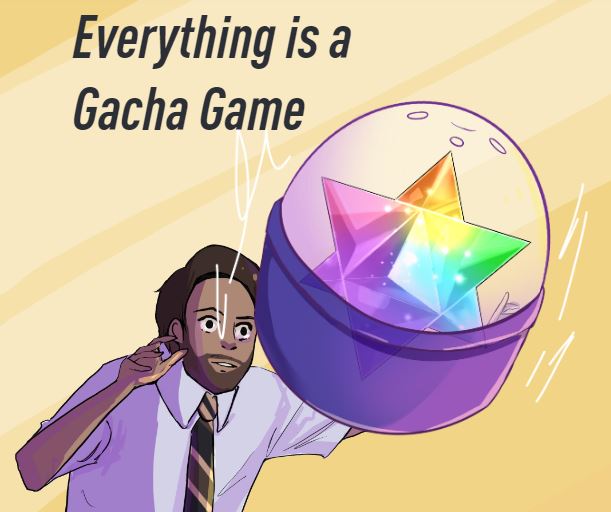
Everything you know is a part of this gacha game known as life. Specifically, life is a gacha game.
Gacha games are video games that implement a specific game mechanic, enticing players to spend in-game currency to gain random in-game items or benefits. Often, these games use the free-to-play model which means players can play some aspects of the game for free… It might be free to start, but players need to keep on gambling to progress in the latter parts of the game, and this is where the dangers of gacha games come from.
Loot Boxes
In a similar vein to gacha games, there are loot box-based games. In these games, loot boxes are awarded randomly to players and have prizes you can find inside. Some game developers are generous and will let you open these loot boxes and keep the prize. Some greedy developers “lock” these boxes and require “keys” to access the rewards inside; these keys may cost real-world currency which makes it harder for free-to-play players who don’t have the money to access these benefits.
Social Media
Social media websites and apps are designed to get users to stay on their specific platform for as long as possible by raising various emotions from them and getting as much personalized information from their user base as possible. Scrolling on social media timelines is one big game. If you keep scrolling, maybe you might get a wholesome cat video for that extra rush of dopamine or maybe you’ll see a violent act of racism towards a marginalized group that you may be a part of. Next, you might see an old friend get married to their high school sweetheart and then see an ad for the Duolingo app where the Duolingo mascot gives birth to Scrub Daddy’s child (which is a real TikTok post from their official page!). Doomscrolling on social media timelines is a gamble since people keep coming back to keep scrolling as a distraction. But most users keep coming back to play the social media game until they are satisfied for the time being.
Dating Apps
On the topic of mobile apps, dating apps are some of the most popular IRL gacha games out there. Sometimes players will find characters on these apps that are not suited for them. There is a very low probability of finding the perfect match on these dating apps — almost slim to none. And yet, people still find themselves swiping and playing this game to search for their soulmate. The higher powers that be, the dating app algorithms, choose what appears on the main page. Tinder and Bumble use swiping-based mechanics to sort through profiles. Mindlessly swiping is easy to do on these apps, the time investment in these games may be the price to pay for these games. Or it could be the in-app transactions where players could pay extra money to be featured or have the ability to swipe right more often. Hinge is slightly less unhinged in this randomness factor where players are required to comment or like specific aspects of a profile instead of a simple right swipe. However, these games are addictive because players are constantly searching for their next date or fling… While you’re at it, might as well gamble and catch an STI. Collect them all!
College/Job Applications
Applying to college? Finding an internship or job to work at? The applicant is at the whims of a higher authority, whether that be a college or company. This is just like gacha game developers designing their games to have an extremely low probability to get a desired item or character. College applicants can raise their odds by participating in extracurriculars or studying extra hard for exams; Job seekers can add relevant skills and job experience to their resumes and cover letters to get the best chance of applying to these jobs. However, applicants do not control who gets accepted or rejected. Yes, college recruiters and hiring managers are the individuals who decide who gets accepted or hired. However, many colleges rely on enrollment algorithms and jobs rely on applicant tracking systems to organize all the applications and see who would be best suited for the job using keywords and other technology magic.
Tip-Based Jobs
Working in food service, food delivery, or any other tip-based job is a gamble. The typical tipping rate is 15%-25%. Every now and then, the game might be generous and sometimes you can get a huge-ass tip from an old retired dude who’s feeling generous that day. There is also that dangerous mentality where you can get addicted to how much you can make with tips and, ultimately, it can be hard to leave those kinds of jobs. This is why you see many old ladies who are waitresses; they’re addicted to getting those tips.
Genetics
Sometimes you’re born and that sucks. Some are more genetically blessed than others: some people are born taller, some are born stronger, and some are born white. It is truly up to whatever the genetic lottery grants you. You didn’t decide to be born, but you were the one chosen sperm out of 100 million sperm that came out of your father’s willy. Those are some low odds for a game, at about a 0.00000001% chance to exist. For reference, in the hit game Genshin Impact, the typical likelihood to get a 5-star character is 0.6%, which is somewhat better odds.
It is pretty impressive that you are alive to read this sentence today. You were fortunate enough to be attending UTD, a competitive school, and happened to pick up this magazine and specifically found this article. The likelihood to enjoy simple pleasures like reading this silly article in your free time while procrastinating on your class assignments is so slim, yet it happened! Life is random, but we are all addicted to playing this game. Take a gamble and see if you can beat the odds and get the random item you’ve been wishing for.

Comments